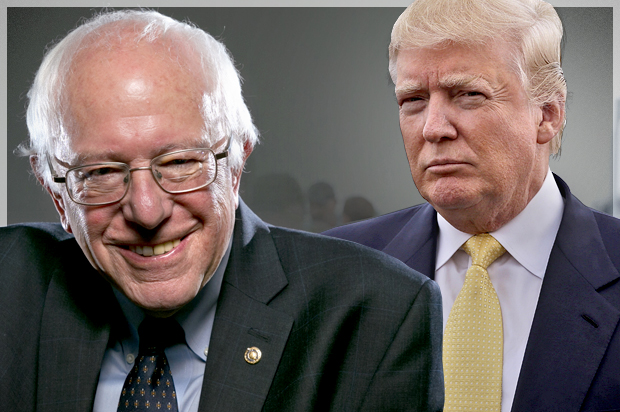Political pundits assume cooler heads will eventually prevail. They figure picking a president is more or less like picking a spouse. Voters might want to have a fling or two, but ultimately will settle on someone who is the marrying kind.
The handlers have their formula. Money plus organization equals victory. Results will follow the formula in the end. They are sure of it.
Party bosses are smugly confident in their ability to pull strings. Enough voters will support who the establishment wants them to support when all is said and done.
Or maybe not.
Consider that in both major parties, the biggest crowds and the most excitement and enthusiasm are being generated by the unlikeliest of characters.
Bernie Sanders calls himself a socialist, embracing an association that most political practitioners in America consider the kiss of death. Never mind that actual socialists don’t consider Sanders one of their kind. Or that others obsess over the distinction between democratic socialists (which they claim Sanders is) and socialists (which they say he is not). What he actually is or isn’t is beside the point. A great many people associate Sanders with the supposedly toxic term “socialist” and he doesn’t discourage it. And his popularity grows.
Donald Trump calls himself a savior. He boasts of his net worth and of his past purchases of politicians. To him every problem is but a high-stakes poker game, and all America needs is a Trump card, a dealmaker-in-chief who knows how to sell to the Chinese and how to build the wall of all walls sealing our southern border and make Mexico pay for it. Republican insiders don’t care to admit it, but Trump is the Frankenstein they themselves built. He is the reflection of noxious elements the GOP establishment eagerly invited into their ranks to construct governing majorities in states across the country and in Congress. That makes him the current Republican frontrunner in the race for the White House.
On the surface, Trump and Sanders appear to have absolutely nothing in common except for unruly hair and the way they say “huge” without the “h.” Dig a little deeper, and it’s clear there is at least one other thing they share.
In their own ways, both Trump and Sanders are birds of a different feather. They stand out from the crowd in their respective parties because they are so unlike all of the other politicians competing with them for the office they seek. Both have their own distinctive brand. Think of Donald Trump, and the last thing you think is Republican. What comes to mind is reality TV and “you’re fired” and casinos and skyscrapers bearing his name and that preposterous combover and one gigantic ego. Trump is his own brand. Bernie Sanders is unquestionably more understated, but no less unique than Trump. Think of Sanders, and you don’t think Democrat. Just as Trump says whatever he damn well pleases, Sanders is the guy on the other side who pulls no punches, who is unafraid of having his views characterized as socialism, and who openly talks of the need for revolution in America.
The pundits and party bosses and handlers will regard Trump and Sanders as passing fads. They will not likely be able to see that their fires are fed by the same fuel. Much is said about how divided we are, how politically polarized America is, how much Republicans hate Democrats and vice versa. Nothing is said about a much more important political phenomenon that is the wind in Trump’s and Sanders’ sails. Most Republican voters don’t care much for most Republican politicians, and most voters who have the habit of supporting Democrats have little use for most Democratic politicians. Trump and Sanders are nothing like most politicians. Most voters think the political system is rigged and corrupt. Trump and Sanders are not seen as creatures of the system.
It’s too early to tell if either Trump or Sanders has what it takes to ride growing intraparty self-loathing all the way to the White House. But for now, what’s clear is that they are both very skillfully tapping into something that the pundits and party bosses and handlers don’t get and will choose to ignore in hopes that it goes away.
Maybe it will. Or maybe, just maybe, it won’t.




























